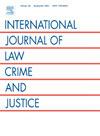Space, devices, activities: A Crime Prevention Through Environmental Design (CPTED) assessment in Kakogawa, Japan
IF 1.4
4区 社会学
Q3 CRIMINOLOGY & PENOLOGY
International Journal of Law Crime and Justice
Pub Date : 2025-07-04
DOI:10.1016/j.ijlcj.2025.100765
引用次数: 0
Abstract
Despite numerous empirical studies evaluating Crime Prevention Through Environmental Design (CPTED) environments, few have conducted a comprehensive assessment covering multiple generations of CPTED principles, particularly in the context of Japan. This study developed and implemented a site inspection survey comprising 15 items structured around three domains: space, devices, and activities, in the city of Kakogawa, Japan. Inspection scores from three study areas with differing environmental and social atmospheres were inferentially compared with local crime statistics and residents’ perceptions of safety. The results showed that total scores aligned with both changes in crime rates and levels of safety perception, indicating that the intensity of CPTED qualities positively influences both objective and subjective security through the combined effects of space, devices, and activities. The study further explores the value of Eastern practices to the theoretical development of CPTED, discusses both perceived and unconscious aspects of preventive measures, and highlights the dynamic nature of CPTED assessment in response to evolving environmental and social conditions. It concludes by emphasising the importance of concurrently addressing inclusive spatial design, quality security devices, and informal social activities to foster safer and more liveable neighbourhoods.
空间,设备,活动:通过环境设计预防犯罪(CPTED)评估在日本Kakogawa
尽管有许多实证研究评估通过环境设计预防犯罪(CPTED)环境,但很少有研究对CPTED原则进行全面评估,特别是在日本的背景下。本研究在日本Kakogawa市开发并实施了一项包括15个项目的现场检查调查,这些项目围绕三个领域:空间、设备和活动。来自三个环境和社会氛围不同的研究区域的检查分数与当地的犯罪统计数据和居民的安全观念进行了推断比较。结果表明,总得分与犯罪率和安全感知水平的变化一致,表明CPTED质量的强度通过空间、设备和活动的综合效应对客观和主观安全产生积极影响。该研究进一步探讨了东方实践对CPTED理论发展的价值,讨论了预防措施的感知和无意识方面,并强调了CPTED评估的动态性质,以响应不断变化的环境和社会条件。最后强调了同时解决包容性空间设计、质量安全设备和非正式社会活动的重要性,以促进更安全和更宜居的社区。
本文章由计算机程序翻译,如有差异,请以英文原文为准。
求助全文
约1分钟内获得全文
求助全文
来源期刊
CiteScore
2.70
自引率
0.00%
发文量
25
审稿时长
47 days
期刊介绍:
The International Journal of Law, Crime and Justice is an international and fully peer reviewed journal which welcomes high quality, theoretically informed papers on a wide range of fields linked to criminological research and analysis. It invites submissions relating to: Studies of crime and interpretations of forms and dimensions of criminality; Analyses of criminological debates and contested theoretical frameworks of criminological analysis; Research and analysis of criminal justice and penal policy and practices; Research and analysis of policing policies and policing forms and practices. We particularly welcome submissions relating to more recent and emerging areas of criminological enquiry including cyber-enabled crime, fraud-related crime, terrorism and hate crime.

 求助内容:
求助内容: 应助结果提醒方式:
应助结果提醒方式:


